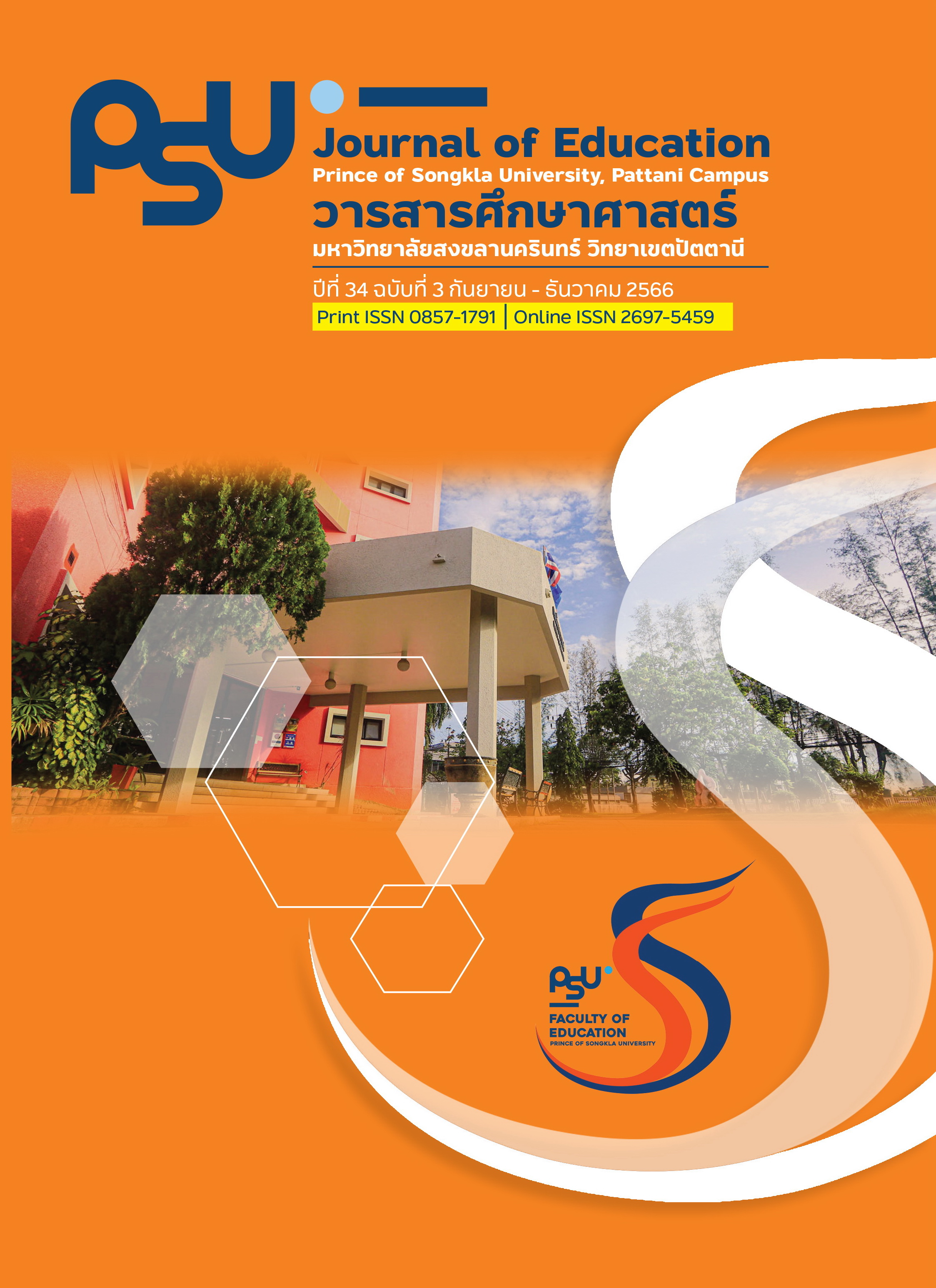การทบทวนแนวทางการพัฒนา “ความฉลาดรู้ด้านวิทยาศาสตร์” ของการศึกษาไทย
Main Article Content
บทคัดย่อ
“ความฉลาดรู้ด้านวิทยาศาสตร์” ถูกใช้เพื่อแทนคุณลักษณะพึงประสงค์ของพลเมืองที่มีคุณภาพ เดิมคำนี้มีความหมายกว้าง ต่อมาเมื่อวิทยาศาสตร์และเทคโนโลยีเกิดการพัฒนาอย่างก้าวกระโดด ความรู้เชิงลึกจึงจำเป็นต่อการแก้ปัญหาที่ทวีความซับซ้อนขึ้น จนทำให้ “ความฉลาดรู้ด้านวิทยาศาสตร์” ถูกสรุปรวมไว้กับเป้าหมายการศึกษา วิทยาศาสตร์ในระดับโรงเรียนด้วย ทั้งนี้ ความฉลาดรู้ด้านวิทยาศาสตร์จึงมีนิยามที่หลากหลาย ขึ้นอยู่กับบริบททางสังคมของผู้นิยามนั้น โดย PISA ได้นิยามว่า “ความสามารถในการเชื่อมโยงสิ่งต่าง ๆ เข้ากับประเด็นที่เกี่ยวข้องกับ
วิทยาศาสตร์ และแนวคิดทางวิทยาศาสตร์ได้อย่างไตร่ตรอง” คำนิยามดังกล่าวถูกกำหนดให้เป็นกรอบการรู้
วิทยาศาสตร์ของนักเรียนอายุ 15 ปี ปัจจุบัน มีความตื่นตัวของครูและผู้ออกแบบกระบวนการเรียนรู้ ทำให้เกิดการ
ศึกษาวิจัยเกี่ยวกับการพัฒนาและส่งเสริมการรู้วิทยาศาสตร์ในประเทศ ซึ่งแบ่งเป็น 3 ประเด็น ได้แก่ ความฉลาดรู้ด้านวิทยาศาสตร์ของครูวิทยาศาสตร์ การพัฒนาแนวทางการจัด การเรียนรู้ในวิชาวิทยาศาสตร์ และการพัฒนาความรู้
วิทยาศาสตร์ของนักเรียน แต่อย่างไรก็ตาม หากพิจารณาจากข้อมูล PISA แล้ว พบว่า นักเรียนไทยยังมีการรู้วิทยาศาสตร์ระดับต่ำกว่าค่าเฉลี่ยประเทศสมาชิก เป้าหมายของบทความนี้ เพื่อให้ผู้กำหนดนโยบายด้านการศึกษา ผู้บริหารโรงเรียน นักวิจัยและนักวิชาการศึกษา ตลอดจนผู้มีส่วนเกี่ยวข้อง ทั้งในและนอกระบบการศึกษานำข้อเสนอแนะไปใช้เป็นแนวทางเพื่อกำหนดแนวทางพัฒนาความฉลาดรู้วิทยาศาสตร์ที่สอดคล้องกับบริบทของการศึกษาไทย
Article Details

อนุญาตภายใต้เงื่อนไข Creative Commons Attribution-NonCommercial 4.0 International License.
เอกสารอ้างอิง
Adams, R. (2003). The Programme for International Student Assessment: An Overview. In R.Adams, M. Wu (Eds.), PISA 2000 Technical Report (p. 15). OECD Publishing.
Baumert, J. (1997). Scientific Literacy: A German Perspective. In W. Graeber, C. Bolte (Eds.), Scientific literacy. An international symposium (p. 167-180). Institut für die Pädagogik der Naturwis-senschaften (IPN).
Branscomb, L. (1981). Only One Science: Twelfth Annual Report of the National Science Board. Superintendent of Documents.
Bucchi, M., & Saracino, B. (2016). “Visual science literacy”: Images and public understanding of science in the digital age. Science Communication, 38(6), 812-819.
Buranasathitwong, P., Sawangmek, S., & Nangngam, P. (2019). Developing of Explain Phenomena Scientifically and Interpret Data and Evidence Scientifically Competencies for Grade 10th Student through Advertising as a Learning Management in Topic of the Digestive System. Journal of Education Naresuan University, 21(2), 212- 224. [In Thai]
Chanapimuk, K., Sawangmek, S., & Nangngam, P. (2018). Promoting Scientific Literacy by using Science, Technology, Society, and Environment (STSE) Approach of Grade 11 Students on Plant Growth. Journal of Education Naresuan University, 22(2), 62-73. [In Thai]
Chinn, C. A., & Malhotra, B. A. (2002). Epistemologically Authentic Inquiry in Schools: A Theoretical Framework for Evaluating Inquiry Tasks. Science Education, 86(2), 175-218.
Holbrook, J., & Rannikmae, M. (2009). The Meaning of Scientific Literacy. International Journal of Environmental and Science Education, 4, 275-288.
Hurd, P. D. (1958). Science literacy: Its meaning for American schools. Educational Leadership, 16, 13–16.
Jaruanlikitkawin, W., & Chaikit, N. (2020). Scientific Literacy of Science Teacher Students. Journal Education Thaksin University, 20(2), 154-165. [In Thai]
Ladachart, L., & Yuengyong, C. (2017). Using Scientific-Inquiry Ativities for Developing Teachers' and Supervisors' Scientific Literacy. Kasetsart Journal of Social Sciences, 38(1), 482–492. [In Thai]
Maienschein, J., Burger, I., Enshaie, R., Glitz, M., Kevern, K., Maddin, B., Rivera, M., Rutowski, D., Shindell, M., Unger, A., Burough, D., Kesh, A., Martinez, J., Tapia, P., & Williams, S. (1998). Scientific literacy. Science, 281(5379).
Maotuek, S., Srisuk, K., Intanate, N., & Hanwong, U. (2015). The Use of Reflective Thinking to Develop the Science Teachers’ Competency in the Instruction to Promote Students’ Scientific Literacy. Journal of Liberal Arts Maejo University, 3(1), 13-36. [In Thai]
Nammungkun, W., Ruangsuwan, C., & Yang, F. Y. (2020). High School Students’ Scientific Epistemic Beliefs. CMU Journal of Education, 4(1), 37-49. [In Thai]
Ngudgratoke, S., & Koedsri, A. (2016). G-DINA Diagnostic Assessment of Scientific Literacy of Lower Secondary School Student Using G-DINA Model. Jounal of Education Khon Kaen University, 41(4), 37-53. [In Thai]
Office of the Education Council. (2015). The Status of Teacher Production and Development in Thailand. Prigwhan Graphic Co., LTD. [In Thai]
Office of the Education Council.. (2018). Education in Thailand 2018. Prigwhan Graphic Co., LTD. [In Thai]
Office of the National Education Commission. (2002). National Education Plan (2002 - 2016): Summary Edition. Prigwhan Graphic Co., LTD. [In Thai]
Organisation for Economic Co-operation and Development [OECD]. (2007). PISA 2006 Science competencies for Tomorrow’s World – Volume 1: Analysis. OECD publications.
Roikrong, W., & Bongkotphet, T. (2019). STEM Problem-Based Learning on Exploration and Production of Petroleum topic to enhance of Scientific Literacy of the 9th Grade Students. Social Sciences Research and Academic Journal, 14(3), 135-148. [In Thai]
Rychen, D. S., & Salganik, L. H. (Eds.). (2003). Key competencies for a successful life and a wellfunctioning society. Germany: Hogrefe & Huber Publishers.
Sharon, A. J., & Baram-Tsabari, A. (2020). Can science literacy help individuals identify misinformation in everyday life?. Science Education, 104(5), 873-894.
Soottiwayaylarkul, W., Bongkotphet, T., & Nakkuntod, M. (2020). Action Research on Developing Scientific Literacy in Animal Anatomy and Physiology Topic Using Argument-Driven Inquiry Method for 11th Grade Students. Humanity and Social Science Journal, Ubon Ratchathani University, 11(2), 254-279. [In Thai]
The Institute for the Promotion of Teaching Science and Technology. (2017). PISA 2015 Assessment and Analytical Framework. The Institute for the Promotion of Teaching Science and Technology (IPST). [In Thai]
The Institute for the Promotion of Teaching Science and Technology. (2020). About Pisa. https://pisathailand.ipst.ac.th/about-pisa/
The Institute for the Promotion of Teaching Science and Technology. (2021). Assessment Results of PISA 2018, Reading, Mathematics, and of Science. The Institute for the Promotion of Teaching Science and Technology (IPST). [In Thai]


